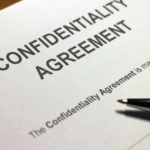🔒 Privacy & Confidentiality for Lawyers in Coworking Spaces: Best Practices
As coworking spaces become more popular among solo practitioners and small law firms, they offer undeniable benefits—flexibility, community, and cost-efficiency. But for lawyers, they also present a unique challenge: how do you protect client confidentiality in a shared environment?
Here are some simple best practices to keep your clients’ information safe while enjoying the perks of coworking:
1. Use Encrypted Tools & Secure Wi-Fi
Always work on a password-protected network (ideally a VPN), and use encrypted platforms for emails and file storage. Never access sensitive files on public Wi-Fi.
2. Be Mindful of Conversations
Sound carries. Use private meeting rooms for client calls or sensitive discussions. If that’s not possible, noise-canceling headphones with a mic can help limit how much others overhear.
3. Lock It Down
Physically secure your laptop, documents, and mobile devices—especially if you’re stepping away from your desk. Always log out or lock screens when unattended.
4. Digital Clean Desk Policy
Just as you wouldn’t leave paper files lying around, don’t leave tabs with client data open or confidential emails unattended. Close, log out, or shut down when you’re done.
5. Know the Rules
Familiarize yourself with your coworking space’s policies around privacy and security. If you’re unsure, ask! Some offer lockable cabinets, private offices, or secure shredding services.
Lawyers have a duty to protect client confidentiality—no exceptions. With just a few intentional habits, coworking can still work for your legal practice without compromising your ethical obligations. ⚖️

